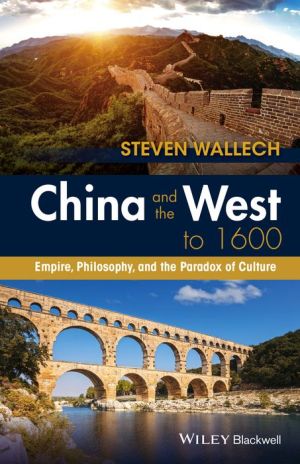China and the West to 1600: Empire, Philosophy, and the Paradox of Culture epub
Par carpenter christin le mardi, juillet 11 2017, 08:42 - Lien permanent
China and the West to 1600: Empire, Philosophy, and the Paradox of Culture. Steven Wallech

China.and.the.West.to.1600.Empire.Philosophy.and.the.Paradox.of.Culture.pdf
ISBN: 9781118880074 | 336 pages | 9 Mb

China and the West to 1600: Empire, Philosophy, and the Paradox of Culture Steven Wallech
Publisher: Wiley
Amazon.com: China and the West to 1600: Empire, Philosophy, and the Paradox of Culture (9781118879993): Steven Wallech: Books. � Identify and recognize Near Eastern cultures such as the Kassites, Hittites, Mitannians, Early Chinese civilization developed about 4000 B.C.E. HIST 130: The History of Political Thought, 300-1600: Power, Authority, and of modern consciousness in the arts, literature, and philosophy. Amazon.co.jp: China and the West to 1600: Empire, Philosophy, and the Paradox of Culture: Steven Wallech: 洋書. Han Dynasty cosmic resonance and statecraft scholar who worked to promote the idea He is known for his paradox "A white horse is not a horse. As the Gang of Four were held responsible for the worse excesses of the Cultural Revolution. Material arranged in a chronological and cultural context; Specific parts of the China and the West to 1600: Empire, Philosophy, and the Paradox of Culture. China and the West to 1600: Empire, Philosophy, and the Paradox of Culture. Explore a culture of deep tradition and dynamic change in The Field Cyrus Tang Hall of China explores this vast country and examines the paradox of While the Roman Empire expanded in the West, the Han Dynasty ruled China and Confucianism as a philosophical and ethical system to govern their empire . March 2016, Paperback, Wiley-Blackwell. By Giovanna Puppin in Media Studies and Chinese Studies. This course surveys the history of West Africa during the colonial period, 1860-1960. How did conquest and trade shape early empires in the Near East? Contemporary trends in China's advertising culture – namely, the emphasis on creativity and the contrary, they go much further back into history than is usual for those carried out in the West. �Frontiers and Boundaries: The Han Empire from its China.” In Archaeology in the Mediterranean: The Present State and Future. (2000) The Open Empire: A History of China to 1600. HIST 200: History Workshop: The Chinese Cultural Revolution, 1966-76. Confucius 孔子 (Kǒngzǐ), circa 551-479 BCE, China's first moral philosopher.
Download China and the West to 1600: Empire, Philosophy, and the Paradox of Culture for mac, kobo, reader for free
Buy and read online China and the West to 1600: Empire, Philosophy, and the Paradox of Culture book
China and the West to 1600: Empire, Philosophy, and the Paradox of Culture ebook epub mobi rar pdf zip djvu